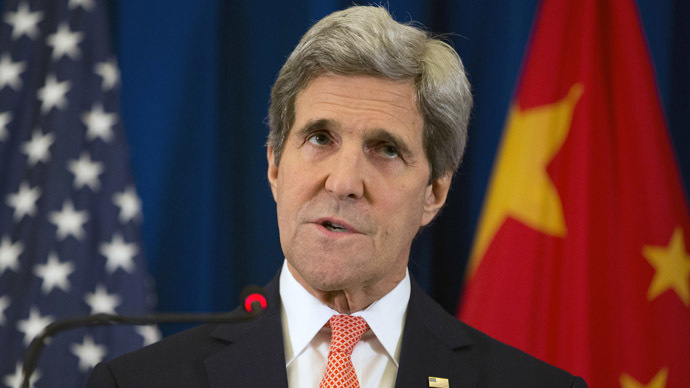Kerry's laughable remarks in Beijing

US Secretary of State John Kerry delivered remarks both laughable and frightening after meeting with Chinese officials in Beijing on Friday.
Regarding China's maritime territory disputes with its Asian neighbors, Kerry asked that China implement “a calmer, more rule-of-law based, less confrontational regime.”
The Chinese leaders doubtless laughed behind the curtains at this comment. For the US state, which has unilaterally attacked and occupied two other nations which never attacked it in the past 10 years, is the last state on Earth to advise anyone on a 'calmer, rule-of-law based' way to resolve international disputes.
Another laughing point was Kerry's call for China to settle its disputes over islands and sea areas according to the International Law of the Sea. The US government itself has refused to ratify this treaty!
The frightening aspect of Kerry's remarks is their thinly-masked support for the US-backed newly aggressive claims by Japan, the Philippines, and some other Asian nations to islands and sea areas also claimed by China. The US has, in fact, recently promised military assistance to both Japan and the Philippines in case of armed conflict with China over ownership of islands or sea areas. This military assistance encourages the aggressive and nationalistic attempts by Japan and the Philippines to shortcut needed negotiations with China for a peaceful settlement of the conflicting maritime claims.
The real agenda of the US ruling elites is not to bring peaceful settlements to the South China Sea maritime issues. It is to promote conflicts between China and the other claimants to maritime areas, and to thereby embroil China in difficulties, blunt the rise of China, dominate the region economically and militarily, and undermine and if possible destroy the Chinese state in its present form.

There is, in fact, a clear parallel between the support the US is now giving to Asian nations with conflicting maritime claims with China, and the massive support the US state gave to the Islamic Jihadists in the late 1970s and 1980s who overthrew the socialist government of Afghanistan.
In the late 1970s, Zbigniew Brzezinski, President Jimmy Carter’s national security advisor, promoted the strategy of training and arming the jihadists in order to lure the Soviet Union into a protracted war in its neighbor country, Afghanistan, which he believed would weaken the Soviet Union. In fact, that war was a contributing factor, though certainly not the only one, in the demise of the Soviet Union.
Similarly, the US state today is attempting to use various Asian countries as its proxies. Its goal is to draw China into various conflicts with these countries, and thereby undermine and weaken China. The crucial difference is that these other states are no match for China militarily, and the US strategy is therefore much more dangerous – because it entails possible direct conflict between the US and Chinese militaries.
In 2010 the Obama Administration declared that freedom of maritime navigation in the South China Sea, whose islands are claimed variously by China, Vietnam, Brunei, Taiwan, Malaysia and the Philippines, is a US national interest. The comment was seen as a response to a Chinese official stating the region was a "core interest" of Chinese sovereignty.
The US is, in fact, currently engaged in a large-scale hi-tech military build-up and strategy in the Pacific region, termed AirSea Battle. This build-up is directly intended to intimidate China and/or prepare for actual war against it. The Pentagon, and US policy-makers, make no secret of these preparations. And these AirSea Battle preparations go hand-in-hand with current US attempts to intimidate China by promising to provide 'military support' to US Pacific allies in case of conflict with China over conflicting claims to islands and areas in the South China sea.
Bear in mind that when dealing with a belligerent power like the US, in conditions such as these, all may seem peaceful until a seemingly small incident triggers a war, like the assassination of a minor duke which triggered WWI.
Finally, the language now publicly used by US officials reflects a definite escalation in the pressure they seek to apply to China. Bill Clinton, when president, described China as a 'strategic partner'; George Bush Jr., as president, described China as a 'strategic competitor.' And recently, some US Congress people have begun to call China an 'adversary,' which is in fact a more polite euphemism for 'enemy.'
Eric Sommer for RT
The statements, views and opinions expressed in this column are solely those of the author and do not necessarily represent those of RT.
The statements, views and opinions expressed in this column are solely those of the author and do not necessarily represent those of RT.












